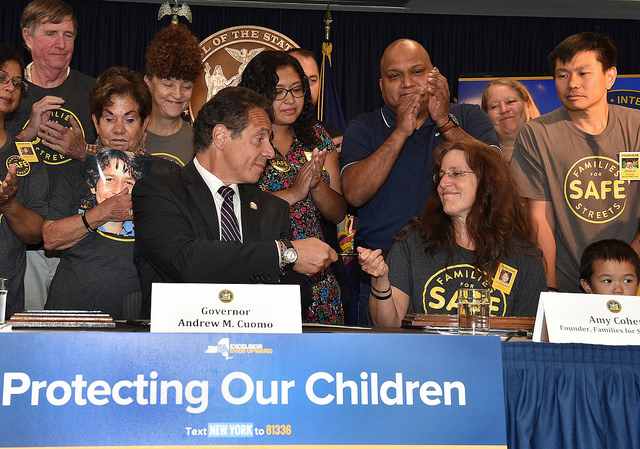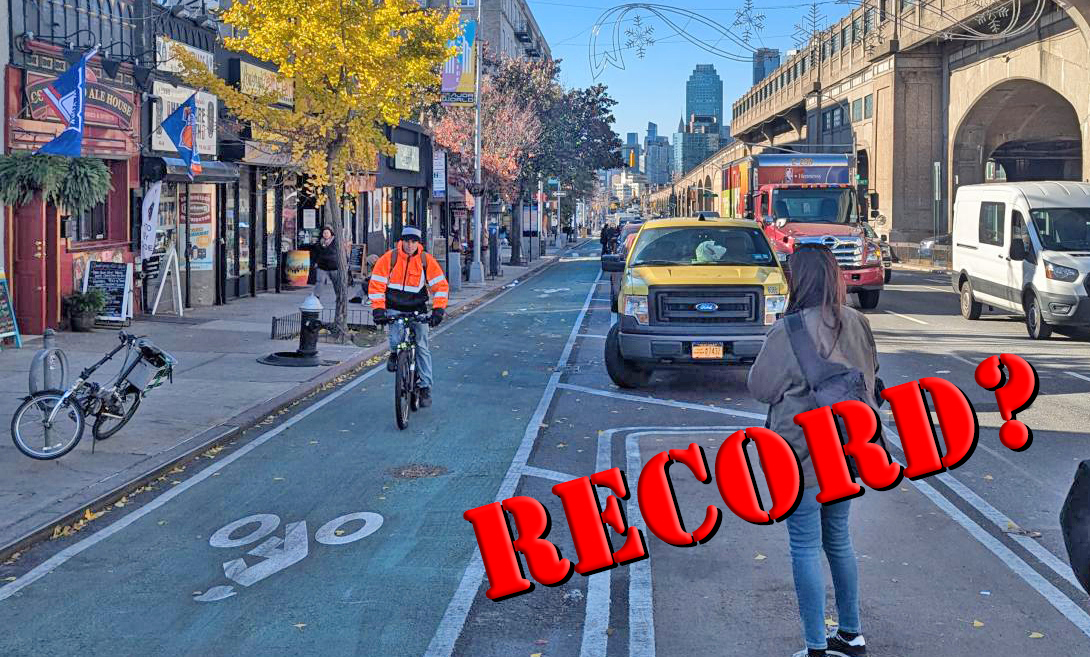Governor Cuomo signed a 30-day emergency executive order this morning giving the city access to the state DMV's license records, the key step in allowing the city to reinstate its 140 school zone speed cameras.
The move highlights the urgency city and state lawmakers are feeling just nine days before the school is back in session. Over a month after Senate Republicans let the camera program expire, the governor, Mayor de Blasio, and Council Speaker Corey Johnson are attempting three-part legal gymnastics to get the cameras back on and save lives.
Here are four things you need to know:
'Aggressive Legal Action'
For years, the city has operated under the premise that it must receive authorization from the state to impose penalties on speeding drivers caught by cameras. Cuomo's executive order attempts bolster the city's legal authority to impose penalties on its own [PDF].
State law pre-empts the city from imposing penalties on matters where the state has indicated intention to do so already. To circumvent that, the speed camera reauthorization is being treated as a "state disaster emergency." The emergency order explicitly suspends the state's ability to prohibit camera enforcement.
"I believe it is legally prudent and legally sustainable, but it is an aggressive legal action," the governor told reporters this morning. "I'm not going to be a Governor who sits by and because the State Senate is playing politics and refusing to come back, we jeopardize human life, especially the lives of children."
A Temporary — And Imperfect — Solution
Per state law, emergency orders expire after 30 days. If the city wants to keep its cameras running after that, it will need reauthorization from the governor.
The impermanence of the approach strengthens the city's legal standing in operating the program. Had Cuomo permanently renewed the program, opponents would have a stronger case that Cuomo was imposing on the legislature's territory.
Under similar logic, the reauthorization merely allows the previous camera program to continue. It does not expand it as the Assembly would have with the "Every School Speed Camera Act," which the Senate failed to take up before going into recess.
"The city law and the executive order doesn't go beyond the law that existed. It's a modest measure," said Transportation Alternatives Legislative and Legal Director Marco Conner. "That strengthens the legality of an executive order, that you take the most modest step necessary."
State Assembly Member Robert Carroll told Streetsblog that he approved of the emergency measure, but said, "The legislature still needs to act."
"It's a great stop-gap measure," he said. "I'm glad the governor, the mayor and the City Council found a Band-Aid to put on this, but the State Senate needs to act. The Assembly bill would have greatly expanded speed cameras."
A Rare Example of Cuomo-de Blasio Harmony
Cuomo signed the executive order at this Manhattan offices on Monday alongside Johnson and Families for Safe Streets co-founder Amy Cohen. Not present was Mayor de Blasio, despite strong support for more cameras.
Later this week, de Blasio will have to issue a "message of necessity" to allow the Council to vote in so the cameras go back on before school starts.
It's not clear why de Blasio was MIA at the governor's press event, but his spokesperson took to Twitter to laud the three-way agreement as a rare example of city-state collaboration.
The Mayor & Governor worked very closely together on this over the last week. https://t.co/sTIrqwEicG
— Eric Phillips (@EricFPhillips) August 27, 2018
More to Come This Week
The last — and typically, quietest — week before school starts is going to be a busy one for City Council members as they work to get the speed cameras back online.
On Tuesday, the Council will hold a hearing on its bill, which has yet to be shared with the public. On Wednesday, the legislative body will vote.
Will Senate Republicans try to stop them? For months, Senate Majority Leader John Flanagan and members of his conference have tried to use the cameras as a wedge to win concessions on other issues. The legislature has the power to override the executive order, but only with the support the Democrat-controlled assembly, which already voted in favor of the speed camera bill. Stopping the City Council and mayor from turning the cameras back on for 30 days will almost certainly require legal action.
We reached out to Flanagan, but have not heard back.
— Additional reporting by Gersh Kuntzman






